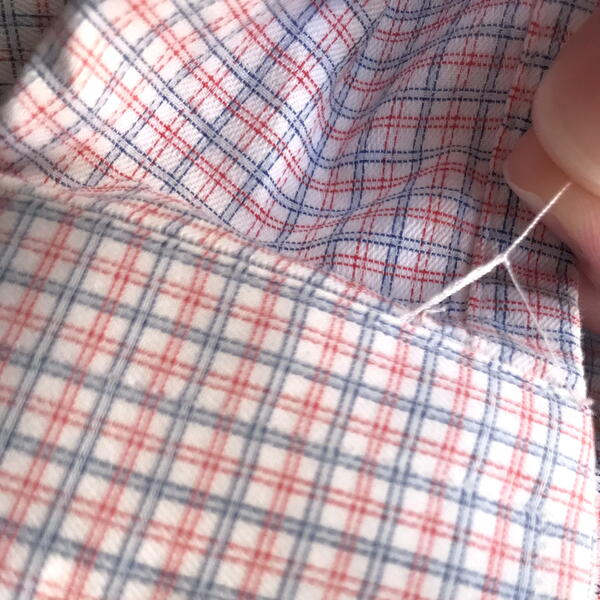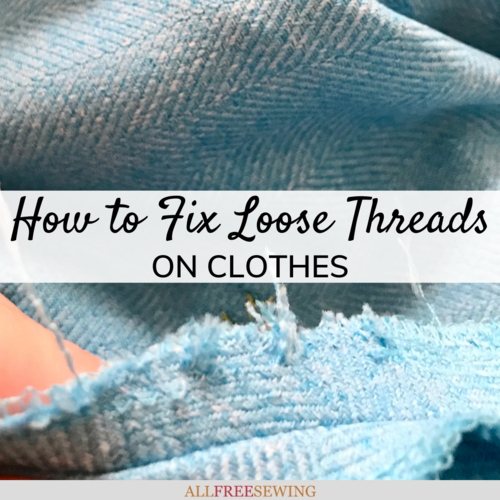How to Fix Loose Threads on Clothes
Seeing loose thread on clothes? Read this guide and learn how to safely fix those snags!
Everyone has dealt with loose threads on their clothing at some point. Dangling strings can be unsightly, cause discomfort, and even damage the fabric if pulled on too much.
Luckily, this issue is usually easy to fix with a few basic sewing tools!
This guide, How to Fix Loose Threads on Clothes, is a must-read for everyone, whether you sew or not.
From hand trimming, serging, and other techniques, you will want to read about all of the ways you can easily and quickly get rid of loose threads on clothing (as well as other items).
These tips will solve this common problem with a few different examples and methods you'll need, as well as help prevent it from happening in the future.
Sign Up For More Free Patterns
Hand-Trimming Loose Threads
If the extra threads are simply dangling and they aren’t integral to the structure of the garment, carefully trim them off with a pair of fabric scissors.

If you don’t have fabric scissors most other kinds will work- but cutting thicker threads might damage paper scissors. Many new store-bought items of clothing have a few loose strings leftover from the manufacturing process.
Those can be hand-trimmed off with your shears like those on other garments. In general, resist the urge to pull loose threads! It can cause more harm than good if the fabric tears or stretches.
Re-Sewing Loose Threads on Clothing
Another option is to sew over or entirely replace a row of stitches on the clothing item. Before re-sewing, you should carefully remove the loose threads using a pair of fabric scissors and/or a seam ripper.
Pin the fabric together (if needed) when fixing loose threads with a machine. Using a thread color that matches the original stitching will help the repair blend in and be less noticeable.
Then slowly sew along the stitch line, being sure to backstitch at the beginning and end. This technique is most useful when threads are loose along seams, so it’s not for holes in knit fabrics where the fibers are coming unwoven. More on that later!
Overlocking (Serging) Loose Threads
If you need to keep a raw edge or hem from fraying (and then the threads coming loose), consider using an overlocker. Also known as a serger or serging machine, an overlocker uses four thread spools to quickly and cleanly finish fabrics.
These spools are available in lots of colors, so choose those that are close as possible to the garment.
Many manufactured garments are already overlocked on the inside. Often it is used to join two pieces of fabric together instead of regular sewing stitches. Home overlocking machines are widely available and relatively affordable (new and used).
There is often a learning curve when threading and operating serger machines.
The edge that is finished is cut off permanently, so it’s important to practice on fabric samples before using it for your nice garments.
Re-Weaving Loose Threads
This technique is a little trickier and more involved than the more simple methods mentioned above.
If the loose threads are actually part of the fabric that is coming unwoven on a damaged knit material, re-weaving might be the best option. Don’t pull or cut these threads off because they might be usable in the repair.
A small hole in an inconspicuous place (like the armpit of a winter sweater) might be fixable with a hand-darning needle and the original loose string. Use new matching thread or string if needed.
Large, conspicuous tears and holes with loose fibers should typically be fixed by a professional seamstress or tailor. Re-weaving might require specialty equipment that is less commonly found.
Up Next
Visible Mending: About & Sewing Guide >>
Have you used any of the above techniques to remove loose threads?

